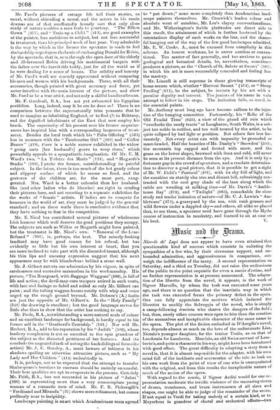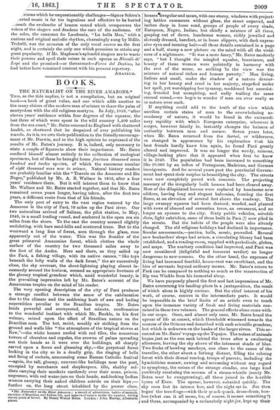Busk an pram
Niceoll, de' Lapi does not appear to have even attained that questionable kind of success which consists in enlisting the sympathies of a few who, by their strenuous support, and un- bounded admiration, and aggressiveness in comparison, out- weigh the indifference of the many. A second representation on Saturday, and a third on Tuesday, did not raise the enthusiasm of the public to the point requisite for even a sue(4.1 d'estime, and no further representation is at present announced. The adapta- tion of the libretto from the novel, it appears, is the work of Signor Marcell°, by whom the task was executed some years ago, and there is no question that the inartistic way in which the task was executed forms the primary defect in the opera. One can fully appreciate the motives which induced the librettist to modify the Selvaggia of the novel, who is simply a camp-following traviata who shares the dangers of the field ; but, then, surely other courses were open to him than the creation of the anomalous and inexplicable character of the seine name in the opera. The plot of the fiction embodied in D'Azeglio's novel, too, depends almost as much on the love of the unfortunate Lisa, Niccole's younger daughter, for the traitor Troilo, as on that of Laudomia for Lamberto. Mautizio, an old Swiss servant of Lam- berto's, and quite a characterin his way, might have been introduced with good effect. The great difficulty in adapting a story from a novel is, that it is almost impossible for the adapter, with his own mind full of the incidents and accessories of the tale, to look on his own work from the point of view of one who is unacquainted with the original, and from this results the inexplicable nature of much of the action of the opera. With regard to the music, if Signor Arditi would for one re- presentation moderate the terrific violence of the unceasing storm of drums, trombones, and brass instruments of all sizes and shapes, one might be able to judge of the remainder of the score. If not equal to Verdi for taking melody of a certain kind, or to Meyerbeer in grandeur of choral and orchestral effects—two risons which he unquestionably challenges—Signor Schira's oerted music is far too ingenious and effective to be buried ...heath the avalanche of brazen sound which overpowers the voices of the singers and deadens the ears of the audience. Of the solos, the canzonet for Laudomia, "La bella Men," with a curious and original melodic rhythm, charmingly sung by Mdlle. Trebelli, was the occasion of the only vocal encore on the first night, and is certainly the only one which promises to attain any great popularity. If Mr. Mapleson's splendid singers are to waste their powers and spoil their voices in such operas as Niccolb de' Lapi and the promised—or threatened—Forza del Destino, he had better have remained content with his present repertory. AMATEUR.































 Previous page
Previous page